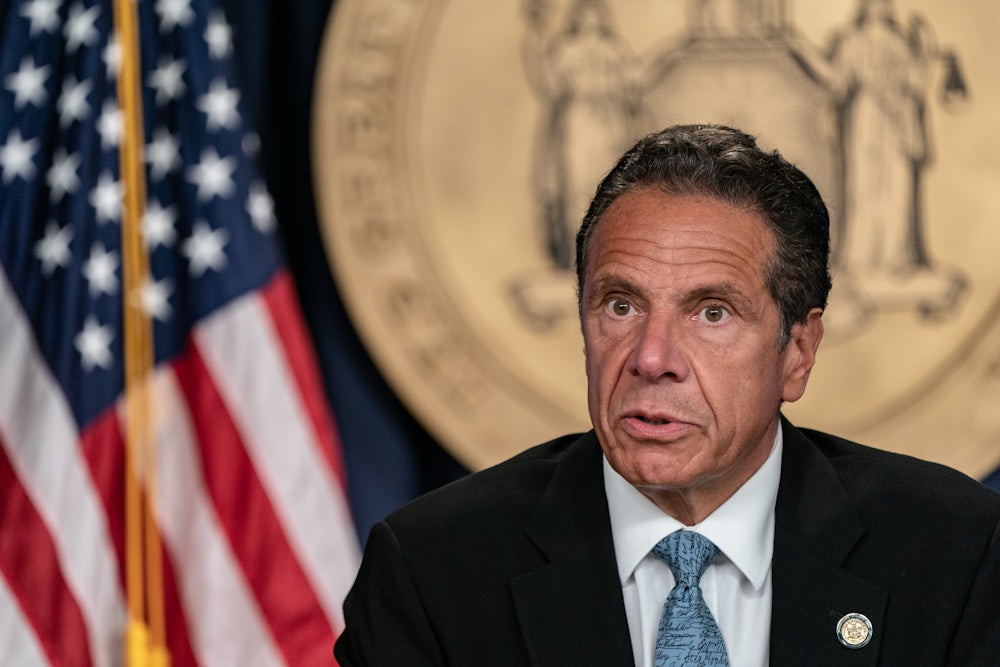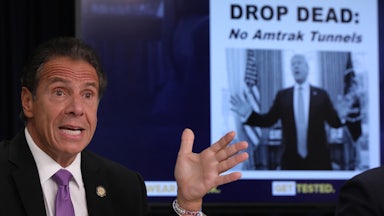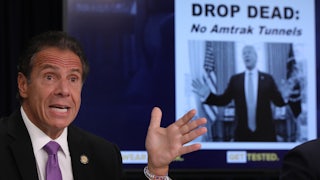Not long ago, New York Governor Andrew Cuomo was amiably shrugging off speculation that he was the leading candidate for the Democratic Party’s 2024 presidential nomination. An August poll found that he was leading in nearly all demographics—the first choice of men, women, voters over 30, and white voters; he led in every region except the West. He was even outpacing Vice President Kamala Harris by two points. The poll, he allowed, was “shocking.” Nevertheless, he pointed to New York’s Covid-19 response and his press briefings, which ran as counter-programming to Donald Trump’s own on television networks throughout the spring and summer of 2020. It was Cuomo, not Joe Biden, who served as Trump’s foil on the pandemic for much of last year; his briefings were consumed by the media as a presentation of seriousness and competence, as well as a trust in science that was missing from the then president’s erratic and frequently insane briefings.
But Cuomo’s political profile has been dented by scandal in 2021. Although controversy over the state’s high number of nursing home Covid-19 deaths has been bubbling under the surface for months, it has boiled over in recent weeks. Last week, Melissa De Rosa, one of the governor’s top aides, admitted that the administration slow-walked an investigation into the number of deaths, which were nearly twice as high as initially reported, out of fear that Trump would use the data to score political points against Cuomo. The governor’s approval rating has subsequently fallen; Cuomo has admitted that his handling of the nursing home data was a “mistake” but has stopped short of apologizing.
Cuomo may very well be wishing he was governor of another state—and not just because New York was hit hard by the pandemic’s first wave, at a time when the virus was still such an unknown quantity. Florida’s Republican governor, Ron DeSantis, is in many ways Cuomo’s polar opposite: DeSantis has spent the last several months sparring with the media, while doing as little as possible to slow the spread of Covid-19. Perhaps most notably, the Sunshine State’s governor showed absolute fealty to Trump throughout the pandemic’s many waves. And yet, his profile is rising steadily even as Cuomo’s has hit another nadir. The divergent fates of these two governors speak to a considerable difference between Democratic and Republican constituencies.
While Cuomo made a show of doing a great deal in response to the pandemic, DeSantis made a show out of doing nothing. Rather than fight the virus, he fought those who urged a more cogent response to the crisis, often villainizing the media in particular. Florida’s businesses remained defiantly open, even as cases soared. When he was criticized for a policy response that seemed baldly ignorant of the available science, he made himself the victim. “We see people dying—it sucks,” he said. “I had no illusions of ever being treated favorably by the Acela media. This is as hard as I’ve ever worked at anything, and I’ve had to work very hard in my life to get where I’m at.” To DeSantis, the big problem with Covid-19 wasn’t that people were dying—though that does suck, doesn’t it? Rather, the problem was that people dared to question his laissez-faire approach to public health.
Florida is, as ever, a strange case. The state is third in deaths—30,000 have died of Covid-19, which does indeed suck—but twenty-seventh in death rate, a number far lower than in New York and California. The warm weather may deserve more credit for those numbers than DeSantis (as much of the South endures a record cold spell, it is, as ever, 80 degrees in Florida). But his refusal to back the science and his insistence on scrapping with the media have turned him into a cause célèbre on the American right. As other heirs to Trumpism fizzle and stumble, DeSantis is locking in a strong position for the 2024 Republican primary, should Trump refuse to run, that is. “Any serious handicapper would have to put DeSantis in tier one for 2024. And tier one is not big,” said Republican pollster (and serious handicapper) Tony Fabrizio.
“What we showed in Florida is you need to lead. I got a lot of blowback. A lot of that was BS, quite frankly,” DeSantis told Politico after a recent event in Miami. “We led on schools. We led on putting people back to work. We would not have had a Super Bowl [in Tampa] if it was not for me.”
DeSantis scratches an itch for Republicans: He disdains expert opinion and spars with the press; at every turn, he has privileged the short-term future of Florida’s economy over the long-term future of its residents. Owning the libs is more important than, well, doing anything at all.
Contrast that with Cuomo. He was, for a time, the darling of liberals because he made a point of appearing to do everything. Where the Trump administration flippantly dismissed the crisis, he was somber and reflective. He put stock in science and always listened to the experts. Where Trump only seemed to offer shrugging, haphazard leadership, Cuomo made the point of turning his regular addresses into pep talks for those left isolated by the pandemic. And yet he, too, mismanaged the crisis, failed to protect some of his state’s most vulnerable residents, and covered up the extent of that failure. Unlike DeSantis, he is paying a political price for these failures.
Perhaps Cuomo might resolve his political problems with a geographic solution and leave New York for a climate that’s seemingly more hospitable to public health failures. Call it the Snowbird Solution: If he were to switch his party ID and move south, as many New York residents do, he may very well have a bright future, after all. There’s still plenty of time: Florida’s GOP gubernatorial primary isn’t for another year and a half.








